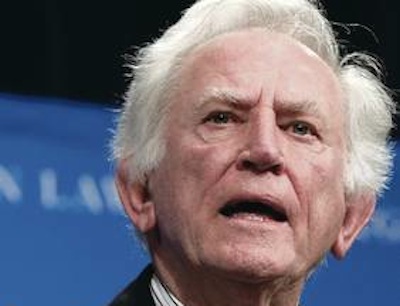
Former US Senator Gary Hart this week met with politicians in the North and representatives from the Dublin and London governments as part of a new US peace effort in Ireland.
The former US senator was asked by Washington to assess the state of the peace process in Ireland.
Gary Hart, a two-time contender for the Democratic presidential nomination in the 1980s, was asked by US secretary of state John Kerry to establish the extent of the current problems at Stormont and whether the US administration can help.
However, Whitehouse officials said Mr Hart was travelling “in a personal capacity”. The mainstream media has also played down the former Senator’s involvement.
Stormont is currently deadlocked by a range of impasses, with the Democratic Unionist and Sinn Fein-led five-party mandatory coalition unable to reach consensus on numerous key issues, ranging from welfare reform to parades and the Irish language.
The Dublin and London governments have been broadly criticised for doing little to disturb the stalemate in Belfast, while the US government has also retained much of its policy structure from the 90s.
Eight months ago, talks chaired by former US diplomat Dr Richard Haass ended in failure. An effort to reconvene negotiations in July suffered a similar fate, when unionists walked out as part of protest action against a partial ban on a contentious Orange Order parade.
The visit came as a former senior aide to ex-president Bill Clinton, Nancy Soderberg, accused political leaders in Ireland of an “abysmal abdication of leadership” and being “far too stuck in the past”.
Emerging from his encounter with the US diplomat, Deputy First Martin McGuinness said: “I met with Senator Hart and briefed him on the current serious challenges facing the political process in the North.
“I made it clear that Sinn Fein welcomes continued US engagement in the political process as the US has played a positive role in the development of the Irish peace process.
“It remains our view that we can find a resolution to all the difficulties facing the political process through genuine engagement by all parties and a hands-on proactive approach by the British and Irish governments in any negotiations.”
Meanwhile, Sinn Fein leader Gerry Adams repeated his call for the Irish and British governments to “refocus their efforts to defend the political process in the north”.
Noting how the involvement of the two governments and the White-house was crucial to securing an IRA ceasefire 20 years ago, the Louth TD said a similar level of engagement was required to deal with the outstanding issues of the peace process.
“I am calling on both governments to urgently refocus their efforts to defend the political process and en-sure the full implementation of the Good Friday and subsequent agreements,” he said.
But the DUP’s Nigel Dodds said there would be no fresh round of Haass talks.
He said he was happy to brief the visiting American on issues like parades and welfare reform, but believed any future discussions must be “internal to Northern Ireland”.
“I think it’s always useful to brief the US administration, they will continue to take a keen interest as we continue to have strong links, but I think in political terms I don’t see any role,” he said.
![[Irish Republican News]](https://republican-news.org/graphics/title_gifs/rn.gif)
![[Irish Republican News]](https://republican-news.org/graphics/title_gifs/harp.gif)

